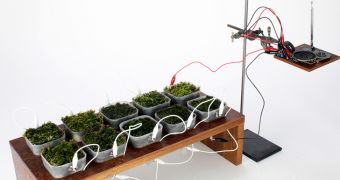As surprising as this may sound, it turns out it is possible that, at some point in the future, people turn to moss to charge their gadgets, maybe even power their homes.
Thus, designer Fabienne Felder and researchers working with the University of Cambridge in the United Kingdom have recently completed work on an innovative system that they say harnesses energy generated by moss.
Besides, the designers and the brainiacs who worked on this project argue that the energy collected in this manner can be fed into phones and the like, and thus be used to charge them.
Modern Farmer details that, while busy photosynthesizing in order to keep itself alive and perfectly green, moss more often than not creates surplus electrons that it has no need for.
It is this source of energy that Fabienne Felder and the University of Cambridge researchers managed to tap into with the help of the system that they created.
By the looks of it, the designer and the European scientists have until now managed to harness merely 0.1% of the overall power generating capacity of the moss that they got to toy with.
However, they claim that this output was more than enough for them to get a radio to function for a couple of minutes at a time. The radio, dubbed Moss FM, is pictured above.
The radio's creators claim that, in order to keep Moss FM up and running continually, one would have to harvest the energy potential of about 10 square meters (roughly 107.6 square feet) of plants belonging to said species.
Since doing so has high chances to prove a bit of a headache, Fabienne Felder and the scientists are now focusing on making their system more efficient.
They hope that it will not be long until they figure out a way to harvest more than 0.1% of the power moss has to offer, and that these plants will become a reliable energy source sometime in the future.
“What if we could transform an entire rice paddy into an electric generator? That’s when it starts to get interesting,” Fabienne Felder told the press in a recent interview.
The designer and the University of Cambridge researchers estimate that, should London's entire population use moss energy to charge their phones for two hours on a regular basis, the city would end up saving 42.5 million kWh.
According to Fabienne Felder, this amount of saved power would be more than enough to meet the demand of a whole town.

 14 DAY TRIAL //
14 DAY TRIAL //